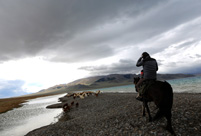 US aircraft carrier docks in HK, welcomes PLA aboard
US aircraft carrier docks in HK, welcomes PLA aboard
 Graduation season: 'Take graduation photos to mark our love'
Graduation season: 'Take graduation photos to mark our love'
 College-student-turned nun becomes famous on Internet
College-student-turned nun becomes famous on Internet
 Japanese airplanes tail Chinese warplane in China's ADIZ
Japanese airplanes tail Chinese warplane in China's ADIZ
 China applies for UNESCO listing of Nanjing documents
China applies for UNESCO listing of Nanjing documents
 Picturesque scenery in Hongcun Village
Picturesque scenery in Hongcun Village
 Japan's PM vows to resume commercial whale hunt
Japan's PM vows to resume commercial whale hunt
 Luoyang aims to become 'Chinese Culture City'
Luoyang aims to become 'Chinese Culture City'
 Century-old jade disc found confirms ancient legend
Century-old jade disc found confirms ancient legend
 A serious mind behind Chinese leader
A serious mind behind Chinese leader
BEIJING, June 18 -- A Chinese marine inspection has detected Cesium 134, a marker nuclide of Fukushima, the State Oceanic Administration (SOA) announced on Wednesday.
The SOA is building a Western Pacific marine environment inspection and early-warning system and during an expedition over 5,500 nautical miles in 27 days, 53 observation stations have been installed, five with a monitoring depth over 1,000 meters.
Cesium 134, a characteristic nuclide leaked from the 2011 meltdown of the Fukushima Daiichi nuclear complex following a tsunami, was detected in several such observation stations, the SOA said.
He Jianhua, chief scientist of the expedition, said the increased depth of monitoring will help monitor radioactive pollutants in Chinese seas.
 Graduation photo ideas: reliable alumnus and happy alumna
Graduation photo ideas: reliable alumnus and happy alumna Super daddies in 2014 World Cup
Super daddies in 2014 World Cup College girls take stylish photos to help enrollment
College girls take stylish photos to help enrollment Rebuilding the silk road
Rebuilding the silk road Top 10 Chinese products scoring World Cup goal
Top 10 Chinese products scoring World Cup goal PLA units hone their tank combat skills
PLA units hone their tank combat skills Attendants shine at Xinjiang-Lanzhou high-speed rail
Attendants shine at Xinjiang-Lanzhou high-speed rail Jiuzhai Valley - fairyland of the world
Jiuzhai Valley - fairyland of the world Can't take eyes off national teams in World Cup
Can't take eyes off national teams in World Cup In Pictures: Female fans of World Cup
In Pictures: Female fans of World Cup China's top 10 representative architectures
China's top 10 representative architectures Photo story: A day of 'mini girl'
Photo story: A day of 'mini girl' Top 20 hottest women in the world in 2014
Top 20 hottest women in the world in 2014  Cute animals' leisure summer in zoo
Cute animals' leisure summer in zoo Exhibition of the Buddha held in Tibet
Exhibition of the Buddha held in TibetDay|Week|Month